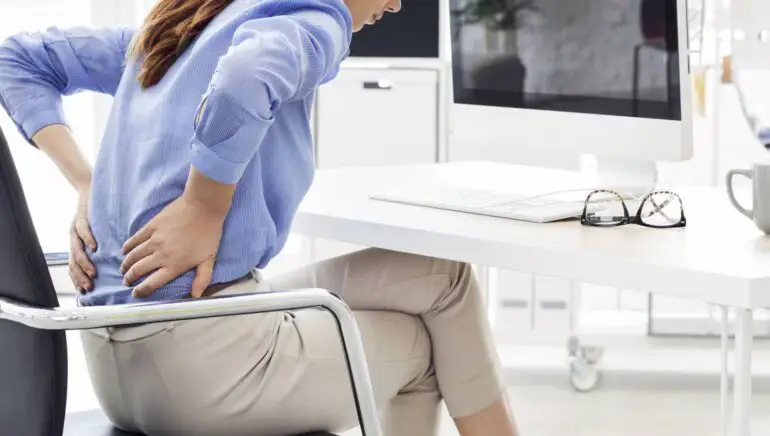
In our modern world, sitting has become part of daily life, especially for those under 50 who balance demanding work, commuting, and relaxation time. But here’s the truth that often goes unnoticed: sitting too much is harmful, with significant health risks that go beyond weight gain or temporary discomfort. Studies show that prolonged sitting can lead to serious health consequences, including sedentary lifestyle dangers that affect even the young and seemingly healthy.
In this article, we dive into the health risks of sitting too much and why people under 50 should pay attention now. From cardiovascular health to mental well-being, the dangers are real—and preventable with the right steps.
Table of Contents
What Does “Sitting Too Much” Mean and Why It’s Harmful

Let’s clarify what sitting too much really means. It’s not just about being seated for a few hours but rather about consistently spending more time sitting than standing or moving. The average adult spends over seven hours a day sitting, and for those with desk jobs, this number is often much higher. This sedentary behavior, also known as sitting disease, brings about negative effects that compound over time.
Prolonged sitting affects your heart health, muscle tone, and even your mental health. But the good news? By understanding these risks, you can take small steps to counteract them before they become serious issues.
Sedentary Lifestyle Dangers: How Sitting Too Much Impacts the Under-50 Crowd

The effects of sitting too much might seem minimal in your younger years, but they build up over time. Let’s explore how a sedentary lifestyle specifically affects various under-50 groups and the health risks associated with it:
Health-Conscious Millennials (Aged 25-40)
Millennials are known for prioritizing health, yet the demands of desk jobs or remote work can lead to hours of sitting. Sedentary lifestyle dangers like weight gain, stiffness, and weakened muscles can quickly offset fitness efforts. To maintain physical activity benefits and counter these effects, it’s crucial for millennials to incorporate movement breaks during the day.
New Parents (Aged 25-35)
New parents may not have a desk job but often find themselves sitting too much with young children. Between feeding, playing, and resting with their child, prolonged sitting can lead to decreased stamina and back pain. Without realizing it, new parents are exposing themselves to sitting disease, which can impact their long-term health and energy levels.
Middle-Aged Professionals (Aged 40-55)
For those in high-pressure roles, daily commutes and desk-bound work hours can result in hours of sitting too much. This prolonged sitting poses significant health risks, such as chronic diseases and poor circulation. Taking active breaks or using a standing desk can reduce these risks and promote healthier aging.
Health Risks of Sitting Too Much: How It Affects Your Body

The health risks associated with sitting too much go beyond minor aches and pains. Here’s a closer look at the physical and mental consequences of prolonged sitting:
Heart Disease and Poor Circulation
Sitting for extended periods slows down your circulation and increases blood pressure, which can lead to heart disease. When you’re seated, your body uses less energy, and this metabolic slowdown leads to higher cholesterol and blood pressure levels, increasing the risk of cardiovascular issues.
Diabetes and Metabolic Problems
Sitting for long hours affects your body’s ability to process glucose efficiently, contributing to sitting disease. This increases the risk of type 2 diabetes and other metabolic conditions. In fact, studies show that each hour spent sitting can elevate your risk of diabetes by up to 5%.
Back Pain and Musculoskeletal Issues
Sitting too much puts strain on your spine, leading to lower back pain, neck strain, and tight shoulders. Poor posture exacerbates these issues, resulting in chronic pain and potentially permanent damage if left unaddressed.
Mental Health Effects
The mental toll of sitting too much is equally significant. Physical activity is known to boost endorphins, which elevate mood and reduce stress. Without movement, individuals experience heightened levels of stress, lethargy, and even depression.
Physical Activity Benefits: How to Counteract the Effects of Sitting Too Much
One of the best ways to protect yourself from the health risks of sitting too much is through regular physical activity. Here are some benefits:
- Improved Heart Health: Movement helps strengthen the heart, reduce blood pressure, and boost circulation.
- Enhanced Flexibility and Mobility: Regular stretching and movement prevent stiffness and maintain muscle health.
- Metabolic Health: Exercise helps regulate blood sugar and insulin levels, reducing the risk of diabetes.
- Mood Boosting: Physical activity encourages the release of endorphins, lowering stress and enhancing mental well-being.
Making small changes, like standing up every hour or taking short walks throughout the day, can reduce the dangers of a sedentary lifestyle and help you stay healthy.
Under 50 Health Tips: Practical Steps to Reduce Sitting Time
If you’re under 50, now is the time to take control of your health and avoid the dangers of sitting too much. Here are simple yet effective ways to stay active:
- Take Hourly Breaks: Set a timer to stand up and stretch every hour.
- Switch to a Standing Desk: Consider using a standing desk or taking standing calls to reduce time spent seated.
- Incorporate Walking Meetings: If your job allows, consider walking meetings to break up sitting time.
- Use Activity Reminders: Apps and wearable devices can remind you to move regularly.
These strategies not only prevent sitting disease but also improve energy levels and productivity.
FAQs
How many hours of sitting per day is considered “too much”?
Most health experts agree that sitting for over 6-8 hours daily, especially without breaks, can increase health risks. The negative effects of sitting too much are often seen in people who remain sedentary without regular intervals of movement.
What are the signs that sitting too much is affecting my health?
Common signs include back pain, stiffness, decreased energy, and weight gain. Long-term risks include conditions like diabetes, heart disease, and chronic diseases associated with a sedentary lifestyle.
Can exercising for an hour a day make up for sitting all day?
While exercise is beneficial, research suggests that sitting all day can still negatively impact your health, even if you exercise. It’s better to incorporate movement throughout the day to fully offset the dangers of sitting too much.
Is standing all day a better alternative to sitting?
Standing desks are popular, but standing for prolonged periods can cause other issues like joint pain and fatigue. The best approach is to alternate between sitting, standing, and moving throughout the day.
What types of exercises can help counteract the effects of sitting too much?
Simple activities like walking, stretching, yoga, and strength training are effective for reversing the negative impacts of sitting disease and improving overall sitting and health outcomes.
What if my job requires long hours of sitting?
If your work demands extended sitting, make it a point to take short breaks every hour. Consider using a standing desk or incorporating walking meetings. Even small changes can significantly reduce the health risks of sitting too much.
Conclusion
Sitting too much may seem harmless, especially for those under 50, but its dangers are significant and far-reaching. From heart disease to sitting-related chronic diseases, the impact of a sedentary lifestyle cannot be ignored. Whether you’re a busy professional, a new parent, or a fitness enthusiast, it’s crucial to incorporate daily activity to combat these risks.
The good news is that small, consistent changes—like standing up every hour, taking short walks, or incorporating stretches—can make a big difference. By adopting an active mindset now, you’ll not only protect yourself from the health risks of sitting too much but also enhance your quality of life, energy, and longevity.
So, let’s make a commitment today: stand up, stretch, move, and make each day healthier. Share this article with friends, family, or coworkers who might also benefit from these insights. Together, let’s build awareness and take action against the dangers of sitting too much!
Get more information
Here are three reliable websites with authoritative information on the topic of health risks associated with prolonged sitting and sedentary lifestyles:
- Mayo Clinic
Mayo Clinic – What Are the Risks of Sitting Too Much?
Mayo Clinic offers comprehensive insights on the health risks of prolonged sitting, including its impact on heart health, metabolism, and ways to counteract these effects. - Harvard Health Publishing
Harvard Health – The Dangers of Sitting
This article from Harvard Health discusses the physiological effects of excessive sitting and provides actionable advice for breaking up sedentary time to promote long-term health. - American Heart Association (AHA)
American Heart Association – Why Sitting Too Much Can Be Bad for Your Health
The AHA explains how sitting too much impacts cardiovascular health and offers guidance on how to incorporate more activity into daily routines.
Read more



